Lent
LENT MEDITATIONS
Theodora Hawksley, a novice serving in South America, shares her meditations through Lent as she learns to be self-sufficient and live off the land alongside her fellow sisters..
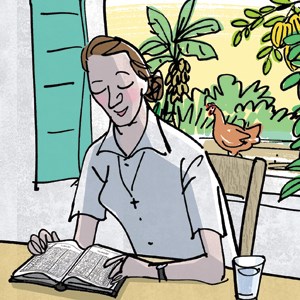 |
ONE: EMBRACING HUMAN FRAILTYLENT THIS YEAR FINDS ME FAR FROM HOME. I am staying with a group of four Ursuline sisters in Karasabai, a village in the interior of Guyana on the edge of the Pakaraima mountains. The sisters, together with a team of Jesuits, minister to the Amerindian villages in this area. It is like Eden here. Each day, we eat whatever we can grow: bitter gourd, bora, cassava, and eggs from our chickens. People give us mangoes, starfruit and bananas, and when they slaughter they bring us beef, which we dry in the sun. It is possible to be completely self-sufficient, but it means living fairly hand-to-mouth: there is no electricity for refrigeration, and you cannot store things for long before the bugs tuck in. READ THE FULL ARTICLE: EMBRACING HUMAN FRAILTY |
 |
TWO: LEARNING SIMPLICITY IN GUYANATHIS WEEK WE HEADED INTO THE MOUNTAINS TO VISIT A SMALL VILLAGE, Tipuru, which sees a priest perhaps only three or four times a year. We made the journey by truck, sitting comfortably on top of sacks of rice. We put up our hammocks in an empty house and gave a few days’ catechesis for local lay leaders and parishioners. READ THE FULL ARTICLE: LEARNING SIMPLICITY IN GUYANA |
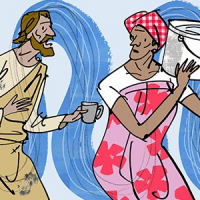 |
THREE: WILL WE BE READY FOR JESUS?“SAMARITAN WOMAN!” SR DIVYA HOLLERED, and the woman looked up and grinned from a distance. Each day, about noon, she walked past our house, past the tap that brought hand-hot water from the plastic bins up the hill, and down to the creek where the water was cool and fresh. She carried the bucket back up the village, water splashing down her leg. From an early age, we are schooled to prepare for Jesus. It is part of our liturgy, and it becomes part of our prayer. When I was little, we even had a book called If Jesus Came to My House. If Jesus came to my house, I would be nice and share my toys. We would put on a gingham tablecloth and offer Jesus something nice from the biscuit tin... READ THE FULL ARTICLE: LEARNING TO PRAY AND WILL WE BE READY FOR JESUS? |
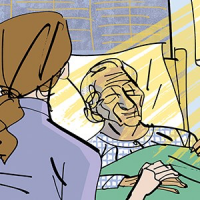 |
FOUR: LEARNING TO SEEWE HAD A FEW HOURS TO WAIT IN KATOONARIB before Fr Jim picked us up in the 4x4. Perry wandered down into the village to borrow a cutlass so we could open some coconuts. When he returned, he asked if I would visit a sick elderly woman in the village. Aunty Katrina was bed-bound and blind. I knelt down by her bed and took her hand. “I can’t see nothing, sister,” she said. “I used to be able to see where the window was but I can’t see that now. I forget my Bible. I can’t read my hymns. I lost all of it. I forget my prayers in my own language, sister.” READ THE FULL ARTICLE: LEARNING TO SEE |
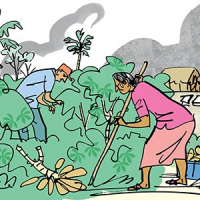 |
FIVE: GLORY REVEALED IN SUFFERING"I’LL BE BACK IN THREE WEEKS. I'LL BRING THE OIL OF THE SICK AND WE'LL ANOINT YOU." Fr Jim had brought Communion to Aunty Irene. Wasted and weak, she had to be lifted up to swallow the host with some water. She died a week later. By the time Fr Jim returned to say Mass for Ash Wednesday, she lay in a cement tomb marked by a white-painted wooden cross. This is the painful reality of mission here: being too few, too little, too late. A handful of priests and four sisters cover an area so vast and remote that some communities see a priest only three times a year. I often feel the reproach that is on Martha’s and Mary’s lips in this week’s Gospel: “If you had been here…” The pastoral need is so overwhelming: if only we had been there, if only we could be there. READ THE FULL ARTICLE: GLORY REVEALED IN SUFFERING |
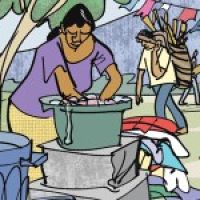 |
SIX: UNNOTICED SUFFERINGAT TIMES, MY MONTHS IN GUYANA HAVE FELT LIKE A PASSIONTIDE. In some ways, suffering is not uppermost in my experience here: people live simply, but all have shelter and food, and there is basic health care and education. Yet the longer I am here, the more I have become aware of an undertow of quiet suffering. READ THE FULL ARTICLE: UNNOTICED SUFFERING |
 |
SEVEN: THE PARADOX OF EASTERIN HER FINAL MEDITATION THEODORA HAWKSLEY REFLECTS ON A PARADOX OF EASTER: suffering and death, Resurrection and Ascension, need not be experienced in sequence, but as one event, one mystery. We had finished loading the quad bike and were ready to set off on the next leg of the journey when a man ran up holding a bucket of coconuts. He was shirtless, mostly toothless, and wild-eyed. “When you come back,” he declared, “I’ll tell you what God has revealed through Johnny Wilson, the poorest man in Monkey Mountain!” We have not yet returned, but what God is revealing is becoming clearer. This Lent in Guyana has been a journey into the mystery of the Cross... READ THE FULL ARTICLE: THE PARADOX OF EASTER |
